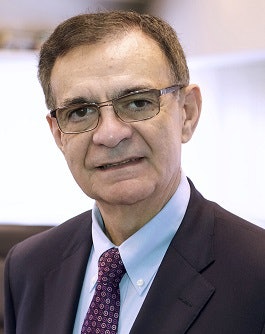Dr. Antonio Pérez, one of the nation’s longest-serving community college presidents, will step down in August after 23 years at Borough of Manhattan Community College (BMCC).
 Dr. Antonio Pérez
Dr. Antonio PérezWhen Pérez was in high school, his guidance counselor told him that he wasn’t college material.
“There is always someone who doesn’t believe in you, but you have to believe in yourself,” said Pérez. “When I tried to go to City College (of New York), I was rejected. I applied as an evening student and was rejected. So I said maybe this guidance counselor was correct that I wasn’t college material. But I didn’t let that affect me. These are the learning experiences from the setbacks, saying ‘I won’t let this hold me back.’”
By taking evening classes at his local community college, Pérez eventually was accepted into William Penn College in Iowa.
After spending nine years as president of Gateway Community College in New Haven, Connecticut, Pérez was appointed president of BMCC in 1995.
“I was raised in Harlem, New York City, so [working at BMCC] was an opportunity to come back and look at life from a different perspective,” said Pérez in an interview with Diverse. “It was kind of a homecoming.”
Throughout his time as president, Pérez has seen BMCC grow from 16,000 to around 27,000 students. During his tenure, the school more than doubled the number of associate-degree programs offered. Additionally, BMCC ranks fifth among associate degree-producing institutions nationwide for awarding degrees to all minority students, according to the U.S. Department of Labor, third for African-American students and eleventh for both Hispanic and Asian American students.
During the September 11 terrorist attacks, Pérez was faced with crisis management after World Trade Center 7 fell onto BMCC’s Fiterman Hall. This marked the first time in United States history that a college campus building had been damaged due to a terrorist attack.
“When I got to the campus, everyone was standing around asking, ‘What are you going to do about this?’” said Pérez. “It’s amazing when you have this kind of a situation, and the expectation is that I’d have all the answers when no one has experienced this. But for me, my role was to find a way that we could respond to the tragedy in our community but also preserve our institution and find the fastest way possible to reopen.”
BMCC became a command center for the firefighters and police officers during the aftermath of the attack. BMCC told Pérez that the school needed to close and couldn’t reopen for another year. However, BMCC was able to open just three weeks after the attacks by using portable classrooms provided by the city.
“My role was that I had to provide the students with a timeline,” said Pérez. “Often times as a leader, you don’t really know what the timeline, is but you have to create one in order to give people hope. I said we were going to reopen in three weeks and people thought I was crazy. What this did for us as an institution was that it solidified us, and that continued throughout my years there.”
In addition to spending more time with his family after he steps down, Pérez will be a professor at Hunter College next September and plans on further developing his app, Hidden Chalk, which is designed to better equip high school and college students for college-level work.
“One never knows when its time [to step down], but you kind of have to figure out what are the things you want to do for the rest of your life,” said Pérez. “When you begin your life, the road is a long one ahead of you, but then you see the road has gotten shorter and you have less time in order to do the things you want to do, so you have to make a decision. My decision, in essence, was that I had other things that I wanted to do, professionally and also with my family.”
He says that educators have to think outside of the box to deal with the challenges that students face. Hidden Chalk, which he created four years ago, is designed to meet a growing need.
“I feel that too often we hit our heads against the wall and try to use the same techniques and vary them a little bit, but not look for a different approach,” said Pérez. “So my approach in creating this app was that I realized how much time students spend on their telephones, and that the telephone is always with them. For example, they might forget their textbook or they may forget their notebooks, but they never forget their phones. I’m providing them with the opportunity to have it all at their fingertips.”
Sarah Wood can be reached at [email protected].





















